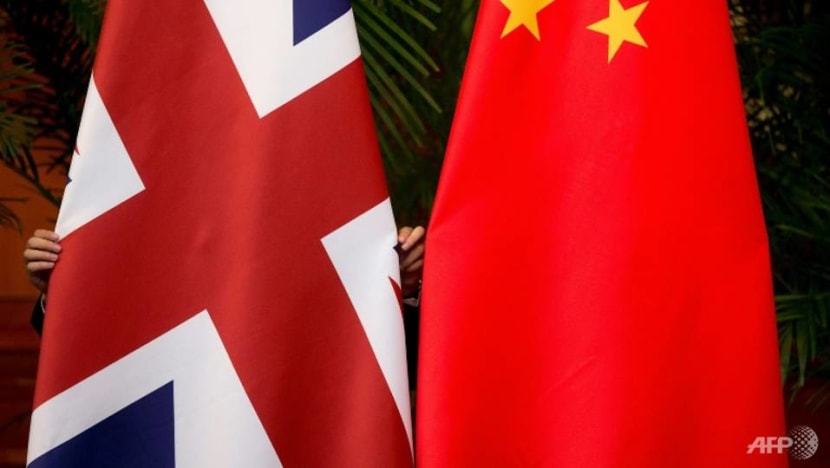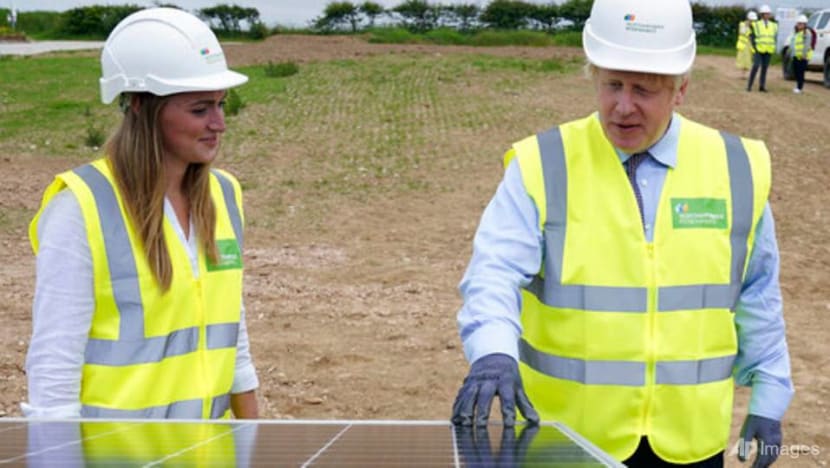commentary Commentary
Commentary: Britain emerges a major global powerhouse in post-pandemic world
Engagement with China, technological innovation, and clean energy should be on the country's agenda if it is to catalyse economic growth in the coming decades, says best-selling author Dambisa Moyo.

A general view shows The Bank of England in the City of London financial district in London, Britain, November 5, 2020. (Photo: REUTERS/John Sibley)
LONDON: Sceptics have long argued that the United Kingdom is past its peak and trading largely on former glories.
They point to the country’s middling rankings in the OECD’s Programme for International Student Assessment education scores and the fact that only one British firm, HSBC, is among the world’s 50 largest public corporations, compared to Germany’s four.
They highlight the likelihood that Brexit will ultimately erode, rather than boost, Britain’s global standing.
But I disagree with this judgment. After all, the UK is one of only a handful of countries to have produced an effective COVID-19 vaccine in record time.
READ: Commentary: Brexit’s impact on London coming into focus after a few gloomy years
It remains at the forefront of shaping the global green-energy transition, and it was the first major economy to enact legislation requiring it to end its contribution to global warming by 2050.
Moreover, the UK retains its traditional strengths of language, location and time zone, strong universities, and deep financial markets, and it remains a standard-bearer for the rule of law.
As the UK hosts the G7 summit in Cornwall, political and business leaders will want to see how well aligned the country is with the three issues that, collectively, will upend global commerce and catalyse economic growth in the coming decades: Engagement with China, technological innovation, and clean energy.
ENHANCING TRADE WITH CHINA
With respect to China, Britain has considerable scope to increase bilateral trade. UK exports to China in 2019 were £30.7 billion (US$43.5 billion), little more than one-third of Germany’s total of $110 billion.

In fact, 2020 was the fifth successive year in which China was Germany’s largest trading partner.
Britain thus urgently needs to expand its trade and investment links with China, which is set to dominate the global economy.
China is already the largest trading partner and foreign direct investor for many developed and developing countries, and it is now the largest lender to emerging-market economies – bigger than the International Monetary Fund, the World Bank, and the Paris Club of sovereign creditors.
Human-rights concerns and ideological differences pose an ethical challenge for Britain when dealing with China. But stepping away from engagement with the Chinese political class would limit the UK’s ability to influence the regime in Beijing and risk setting back the British economy.
READ: Commentary: Euro 2021 - France stands in the way of Ronaldo’s swan song
BOOSTING TECH INNOVATION
In terms of technology, Britain’s role in developing the Oxford-AstraZeneca COVID-19 vaccine underscores its strengths in medical science innovation – as evidenced by a thriving biotech and life sciences sector.
And yet the UK has yet to develop a technology company of global stature and renown, and recent stock-market activity has sent mixed messages to investors.
The initial public offerings of food-delivery company Deliveroo and semiconductor technology firm Alphawave were challenged. Both companies’ share prices fell sharply on their first day of trading and remained below their launch price weeks later.

But the UK is well positioned to benefit from investments and advances in emerging technologies, such as artificial intelligence, that will undoubtedly transform education and healthcare in the coming years.
Moreover, the country has real opportunities to help allies plug technological gaps – not least in semiconductors, where America’s share of global output has fallen from 37 per cent in 1990 to just 12 per cent today.
READ: Commentary: Deliveroo’s IPO is a lesson to not underestimate investors
READ: Commentary: Deliveroo’s IPO - like changing tires while driving
To realise its potential as a science superpower, the UK needs a technology hub that can rival Silicon Valley in its dynamism. That will require aggressively and deliberately building an ecosystem of talent and collaboration across data science, technology, and public policy.
For example, the Oxford-Cambridge arc already supports two million jobs and adds £110 billion to the UK economy each year.
But to rise to the next level, this region must become a vibrant environment for innovation, and be far more visible to leading global investors. This is particularly important given that global foreign direct investment had fallen for three consecutive years (2016 to 2018) even before plummeting 42 per cent in 2020.
READ: Commentary: The global minimum corporate tax rate is coming our way and will change how Singapore attracts MNCs
A BIG ROLE IN CLIMATE CHANGE
On energy, the UK has been a global front-runner in mitigating climate risk through carbon sequestration and capture, and setting a net-zero greenhouse-gas emissions target.
And it has an important opportunity to bolster its credentials as an environmental and green-energy leader when it hosts the United Nations COP26 climate summit this autumn.
Crucially, the UK has a chance to shift the discourse so that the green transition is not only about limiting the economic downside but also about maximising the upside.
In particular, government support for larger-scale investments in solar, wind, hydrogen, biofuels, hydropower, geothermal energy, Generation IV nuclear reactors, and new battery technologies would yield massive returns.

If Britain is to lead in the energy transition, new technologies, and engagement with China, it must overcome several obstacles.
Above all, the currently fragmented “Global Britain” agenda needs to reflect much closer cooperation between the public and private sectors, and become clearer about how to track execution and measure success.
The UK has a strong hand to play. But playing it well will require greater political vision.
British leaders should set in motion a grand scheme that creates a long-term legacy – in the spirit of the Manhattan Project during World War II to develop the first nuclear weapons, or the US government’s Defense Advanced Research Projects Agency, which enabled the subsequent development of Silicon Valley.
As the world emerges from the pandemic, the UK, as host to two major international summits this year, will find itself in the global spotlight. It must capitalise on this unique opportunity and seek to reposition itself for the twenty-first century.
(As climate change intensifies, will we see more activists and communities seeking legal recourse globally? Find out on The Climate Conversations.)
Dambisa Moyo, an international economist, is the author of four New York Times bestselling books, including Edge of Chaos: Why Democracy Is Failing to Deliver Economic Growth – and How to Fix It.












